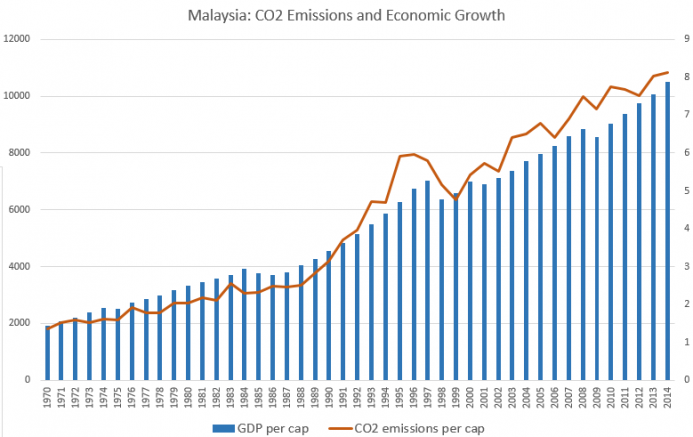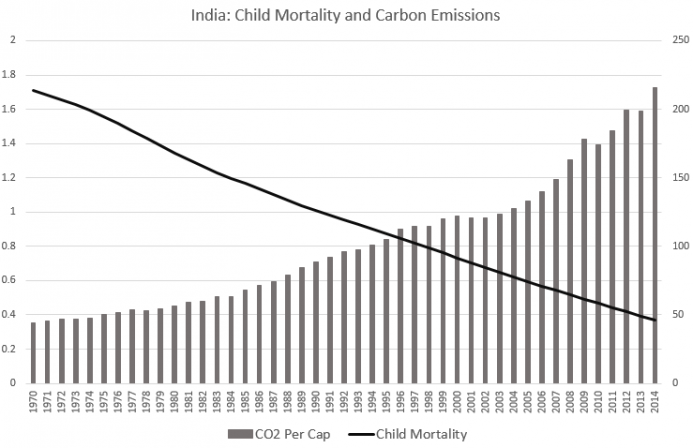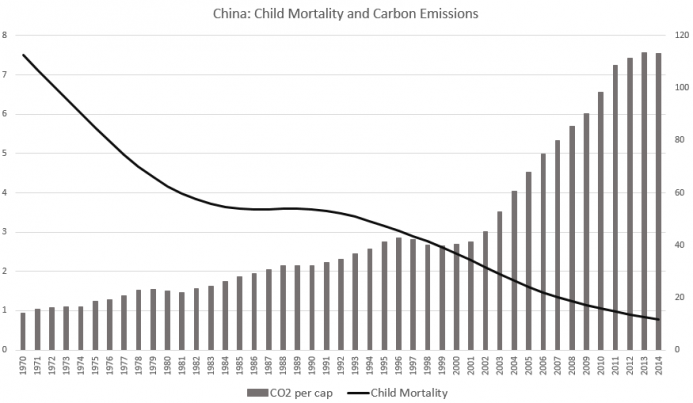After all, if a country wants to get richer, it has to create things of value for other countries. At the lower- and middle- income level, that usually means making things such as vehicles, computers, or other types of machinery. This has certainly been the case in Mexico, Malaysia, and Turkey.
But for countries like these, to only economical way to produce these things is by using fossil fuels.
Thus it is not a coincidence that carbon emissions growth and economic growth track together. We see this relationship in Malaysia, for example:
And Turkey
And also Brazil,
Source
We no longer see this close a relationship between the two factors in wealthy countries. This is due to the fact many first-world (and post-Soviet) countries make broader use of nuclear power, and because high income countries have more heavily abandoned coal in favor of less-carbon intensive fuels like natural gas.
It is thanks to this fossil-fuel powered industrialization over the past thirty years that extreme poverty and other symptoms of economic under-development have been so reduced.
For example, according to the World Bank, worldwide extreme poverty was reduced from 35 percent to 11 percent, from 1990 to 2013. We also find that access to clean water has increased, literacy has increased , and life expectancy has increased — especially in lower-income areas that have been most rapidly industrializing in recent decades.
Just as carbon emissions track with economic growth in middle income countries, child mortality tends to fall as carbon emissions increase.
We see this throughout the developing world, including in India,
And China,
Source
Industrialization isn't the only factor behind reducing child mortality, of course. But it is certainly a major factor. Industrialization sustains modern health care amenities such as climate controlled hospitals, and it increases access to clean water and sanitation systems.
Greta Thunberg, ignores all of this, mocking the idea of economic growth as a "fairytale." But for people in the developing world, money and economic growth — two things Greta Thunberg thinks are contemptible — translates into a longer and better life. In other words, economic development means happiness, since, as Ludwig von Mises pointed out, "Most mothers feel happier if their children survive, and most people feel happier without tuberculosis than with it."
Thunberg's blithe disregard for the benefits of economic growth is not uncommon for people from wealthy countries who are already living in an industrialized world built by the fossil fuels of yesteryear. For them, they associate additional economic growth with access to high fashion and luxury cars. But for the billions of human beings living outside these places, fossil-fuel-driven industrialization can be the difference between life and death.
And yet, Greta Thunberg has seen fit to attack countries like Brazil and Turkey for not more enthusiastically cutting off their primary means to quickly deliver a more sanitary, more well-fed, and less deadly way of life for ordinary people.
The Chinese know the benefits of economic growth especially well. A country that was literally starving to death during the 1970s, China rapidly industrialized after abandoning Mao's communism for a system of limited and regulated market capitalism. But even this small market-based lifeline — sustained by fossil fuels — quickly and substantially pulled a billion people out of a tenuous existence previously threatened regularly by famine and economic deprivation.
Today, China is the world's largest carbon emitter — by far — with total carbon emissions double that of the United States. And while the US and the EU has been cutting emissions, China won't even pledge to cap its emissions any time before 2030. (And a pledge doesn't mean it will actually happen.) India meanwhile, more than doubled its carbon emissions between 2000 and 2014, and its prime minister refuses to pledge to cut its coal-fired power generation.
To be continue on next post...

















